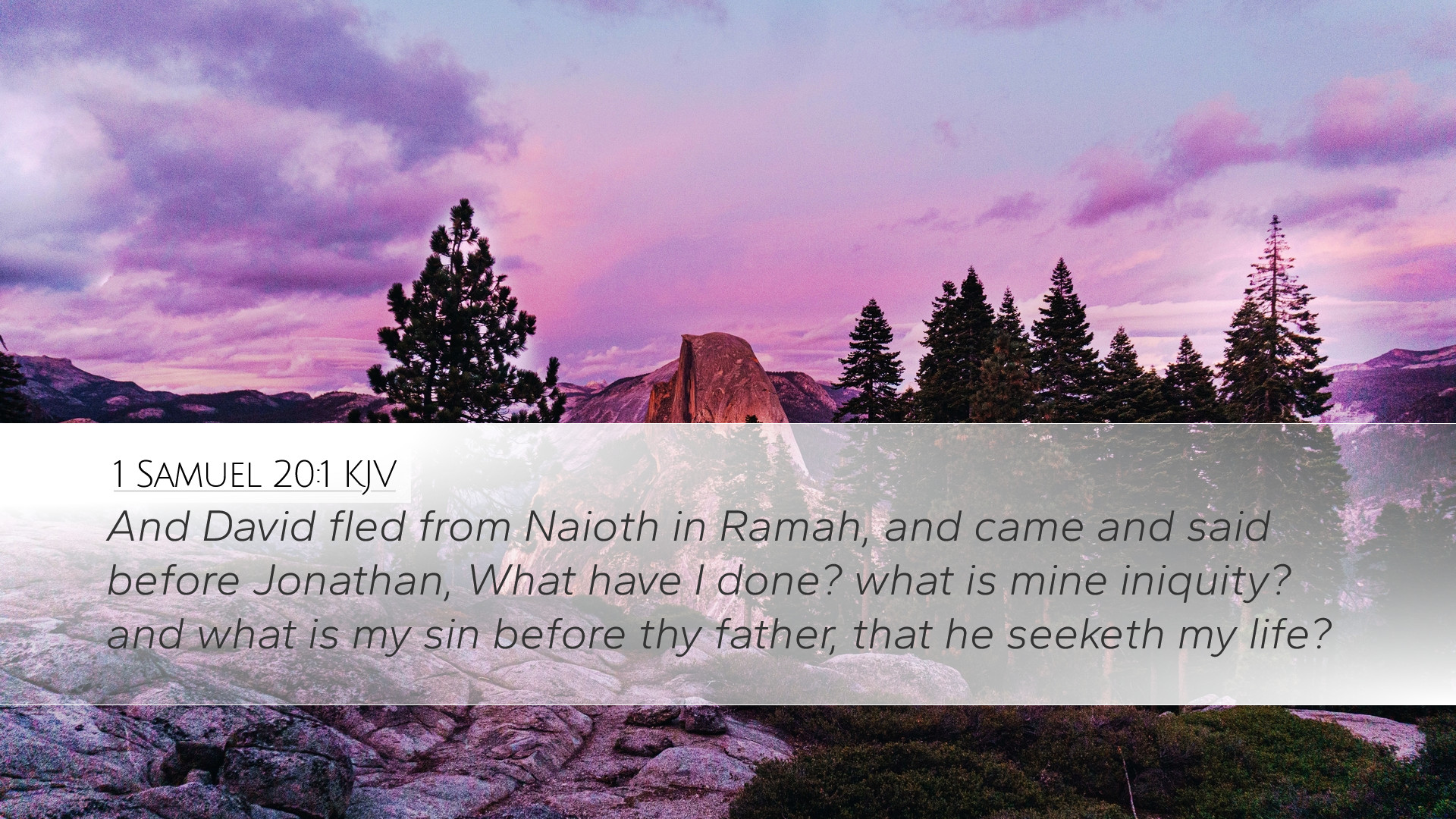Commentary on 1 Samuel 20:1
1 Samuel 20:1 states: "And David fled from Naioth in Ramah, and came and said before Jonathan, What have I done? What is mine iniquity? and what is my sin before thy father, that he seeketh my life?"
Contextual Overview
This passage occurs at a critical juncture in the narrative of David's life, highlighting the complex relationships between David, Jonathan, and Saul. David is on the run, fully aware of Saul's intent to kill him. The friendship between David and Jonathan plays a pivotal role in providing David much-needed support during this turbulent time.
The Significance of David's Flight
According to Matthew Henry, David's flight from Naioth in Ramah signifies the increasing tension and danger posed by King Saul. The prophets of Naioth had earlier provided a sanctuary for David in a time of spiritual crisis; however, the deteriorating political context necessitates David's retreat.
Henry points out that David's movement reflects a sense of urgency and despair. David's inquiries to Jonathan reveal his confusion and sense of injustice, questioning the reasons behind Saul's actions against him.
The Dialogue with Jonathan
David's question in this verse, "What have I done?", encapsulates a deep sense of bewilderment. Albert Barnes notes that David's emphasis on his innocence serves to underscore the deep betrayal he feels from Saul, who once embraced him as a son. David's innocence is further illustrated by his cries of emotional pain and commitment to righteousness.
Understanding Iniquity and Sin
David’s plea includes a profound reflection on iniquity and sin. Adam Clarke elaborates that these terms highlight the moral implications of David’s predicament. David recognizes not only the gravity of Israel's leadership under Saul but also questions how he could have merited such hostility.
This moment invites readers to reflect on the nature of spiritual integrity and relational strife within the community of God’s people. It serves as an important reminder of how the righteous often face persecution despite their moral standing.
Analyzing Saul's Intent
In this passage, Saul is depicted as irrational, driven by jealousy and fear. Matthew Henry asserts that Saul's character is increasingly unstable, leading to an irrational pursuit of David. This irrationality exemplifies the destructive nature of jealousy and power struggles within leadership.
Saul’s actions serve as a warning to leaders in any capacity. The pursuit of power can blind leaders to the righteousness of others, pushing them to commit grave injustices, mirroring the biblical theme of the misuse of authority.
The Role of Friendship
Jonathan’s role cannot be understated in this narrative. Albert Barnes comments on the loyalty and emotional support Jonathan offers to David despite the pressures exerted by his own father, Saul. This relationship serves as a model for true friendship characterized by selflessness, understanding, and courage.
Jonathan symbolizes a faithful companion who recognizes the moral dilemma faced by David and seeks to aid in his escape. This highlights the value of fellowship and the importance of standing by one another during trials.
Theological Reflections
The theological implications of this passage resonate deeply in the Christian tradition. David's lamentation reflects the concept of unjust suffering; an element that foreshadows Christ’s own suffering. Adam Clarke emphasizes that, like David, many faithful believers may find themselves misunderstood and persecuted despite their righteousness.
This verse challenges modern believers to reflect upon their own lives when they face adversity without cause. It compels theological discourse on the redemptive value of suffering and the role of divine justice.
Conclusion
In conclusion, 1 Samuel 20:1 encapsulates profound themes of friendship, integrity, and injustice, which resonate throughout Scripture. It serves as an essential text for pastors, scholars, and students as it navigates complex emotional and spiritual realities faced by the faithful.
The insights drawn from public domain commentaries collectively enhance our understanding of this pivotal moment in David's life, illuminating the burdens of leadership, the power of companionship, and the potency of faith amidst adversity.


